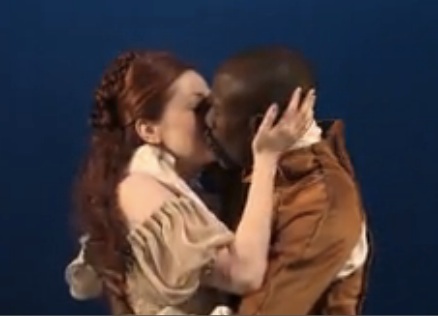The Psychological Dimensions of Alison Darcy’s Othello
I might as well throw this out there. Shakespeare’s tragedies kick his comedies into the dust. I can’t even decide what tragedy I like best: ambitious Macbeth, haunted Hamlet, or fragile Othello. The beauty of these tragedies is not just their poetic language or their compelling plots, but their flexibility. Each director, each actor reshapes the show in new ways while the underlying themes remain universal, rendering each production both fleeting and grand. Scapegoat Carnival theatre’s co-founder Alison Darcy directs Othello this month at the Segal Centre with dramaturgy by Joseph Shragge. While we tend to think of Othello as a study of race, jealousy, and identity, Darcy’s interpretation is psychoanalytic and puts motive and history as the driving forces of the action.
Darcy didn’t want to alter the time period or plot. It’s been about 10 years since the Segal had a Shakespeare,” she says. “It deserves to have a straight interpretation. It’s such a lean play. It doesn’t have much fat. It’s direct without lots of subplots. It’s really about the leads and the main activity. It’s raw and to the point and direct. So, it’s nice to keep it in the period and let the story do its work. We’re not setting it in 1930s NY.”
This decision relates to the concept of exoticism. “It’s set during the age of exploration,” Darcy says. ” Venice is the hub of trading world. All the boats left and came from there. They were picking up objects from around the world. It’s in the midst of this explosion of fascination with different cultures that this Moorish captain Othello (Andrew Moodie) arrives. He suddenly gets high up in the army ranks, but is treated as an outsider. He marries Desdemona (Amanda Lisman) the daughter of a head senator. It’s a mixed marriage, a class jump. There’s an age barrier. This would be dramatic for the time period. Everything that one traditionally fights against, they embrace.”
Prodded into jealousy by baddest baddie Iago, Othello’s marriage unravels. Darcy focuses on more than just jealousy, though, and instead points to an identity crisis caused by being exotic. “[Othello] understands what his role in the society is. When you exoticise a person, their sense of identity is nullified. They become a token or a symbol. Iago (Sean Arbuckle) plays on that. Othello is a token of his culture. His sense of self is diminished. This is why he goes so crazy. “
Similarly, a loss of identity drives Iago as well. “Iago starts at the top, when his job is given to this young upstart, a man who is not a soldier. This snotty kid,” explains Darcy. “Iago’s been placed in the role of advisor. He’s castrated a bit. His identity as a warrior is taken from him. His revenge is not purely the weak excuses given in the play. It’s really that his sense of self has been wasted and diminished.”
Of course, there’s no getting around Iago as the embodiment of evil. “Of all of Shakespeare’s characters, Iago is the most evil,” says Darcy. “Our modern take on evil is that humans all have capacity for good and evil. It’s our own choice and we can indulge one side or the other. There is no pure evil. There are evil deeds but not evil people. But, at this time, at the time the play was written, Shakespeare had already written on the dual nature of good and evil in people. With this play, he went a step further, and asked what if there is real evil, pure evil. He wanted to see how far he could push a realistic character to be evil before the character becomes a caricature.”
Finally, Darcy uses psychology to address Desdemona’s persistent love for her jealous husband. “Shakespeare isn’t sexist the way people say,” Darcy says. “He shows the plight of women. In this way, Desdemona is interesting. She’s a completely naïve, loved creature and sustains it throughout the play, this unbelievable purity of love. She loves Othello even after he kills her. A lot of people get angry – that she’s just abused and not standing up for herself. I think otherwise. Emilio stands up for her. Think of the strength it takes to marry someone that no one in your life would approve of and go off with. She goes to war with Othello. At end, she is determined that even if Othello kills her, it must be an evil-doing on someone else’s part. She’s determined to believe in the power of love. The play makes you look at how strength in love can be displayed.”
Othello runs at the Segal Centre (5170 Côte Ste. Catherine) from October 17 – December 1. Shows M, T, W, Th, S, S. Tickets start at $24. Show at 8 p.m. with matinees on Sundays and Wednesdays.







